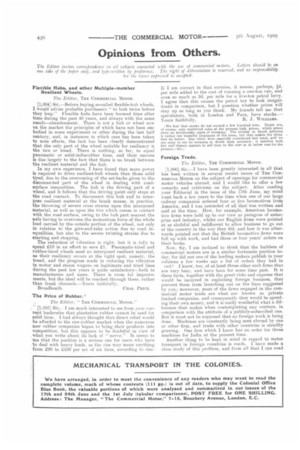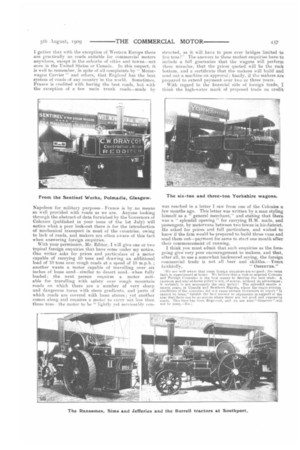Opinions from Others.
Page 14

Page 15

If you've noticed an error in this article please click here to report it so we can fix it.
The Editor invites correspondence on all subjects connected with the use of commercial motors. Letters should be on one side of the paper only, and tyPe-written by preference. The right of abbreviation is reserved, and no responsibility for the views expressed is accepted.
Flexible Hubs, and other Multiple-member Resilient Wheels.
The Editor, THE COMMERCIAL MOTOR.
[1,004] Sir,—Before buying so-called flexible-hub wheels, I would advise probable purchasers " to look twice before they leap." Flexible hubs have been boomed time after time during the past 40 years, and always with the same result—abandonment. There is not a huh or wheel now on the market the principles of which have not been embodied in some experiment or other during the last half century, and, in instances in which care has been taken to note effects, the fact has been clearly demonstrated that the only part of the wheel suitable for resiliency is the tire or tread. There is nothing, so far, to equal pneumatic or solid-indiarubber tires, and their success is due largely to the fact that there is no break between the resilient material and the hub.
In my own experience, I have found that more power is required to drive resilient-hub wheels than those solid tired, due to the overcoming of the set-backs given to the disconnected part of the wheel in dealing with roadsurface inequalities. The hub is the driving part of a wheel, and it follows that the driving point only stops at the road contact. To disconnect this hub and to interpose resilient material at the break means, in practice, the throwing of severe cross strains upon this interposed material, as well as upon the tire which comes in contact with the road surface, owing to the hub part nearest the sxle having to overcome the momentum force of the whole load carried by the outside portion of the wheel, not only in relation to the give-and-take action due to road inequalities, but also to the severe twisting strains due to starting and stopping.
The reduction of vibration is right, but it is folly to spend £10 in an effort to save Li. Pneumatic-tired and rubber-tired wheels need no interposed resilient material, as their resiliency occurs at the right spot, namely, the tread, and the progress made in reducing the vibration tn motor and steam wagons on legitimate and tried lines during the past few years is quite satisfactory—both to manufacturers and users. There is room for improvements, but the ideal will be reached through these, rather than freak channels.—Yours faithfully, Broadheath. CHAS. PRICE.
The Price of Rubber. I
The Editor, " TIIE COMMERCIAL MOTOR."
[1,005] Sir,— I am much interested to see from your current leaderette that plantation rubber cannot be used for solid tires. Lhad always thought that direct relief would be afforded to the raw-rubber market when the numerous new rubber companies began to bring their products into competition, but this appears to be doubtful in view of ,what you write about its lack of " nerve." It seems to Srne that the position is a serious one for users who have to deal with heavy loads, as the rise may mean anything from £30 to £100 per set of six tires, according to size. If I am correct in that surmise, it means, perhaps, id. per mile added to the cost of running a one-ton van, and oven so much as 2d. per mile for a five-ton petrol lorry. I agree that this causes the petrol tax to look insignificant in comparison, but I question whether prices will stay up as long as you think. My friends tell me that speculators, both in London and Para, have stocks.—
Yours faithfully, R. J. WILLIAMS.
Wefear that stocks do not exceed a few hundred tons. There are, of course, only restricted sales at the present high prices, which prices show no trustworthy signs of breaking. The trouble in South America is rather the wasteful treatment of the trees., but that makes the situation no hotter. Our views were carefully considered last week, and we are sorry to see no occasion to doubt their accuracy: it behoves both tire and chassis makers to sell tires to the user at or below cost for the present.—En.]
Foreign Trade.
The Editor, THE COMMERCIAL MOTOR.
[1,006] Sir,—I have been greatly interested in all that has been written in several recent issues of THE COMMERCIAL MOTOR on the subject of openings for commercial motor vehicles abroad, and I would like to offer a few remarks and criticisms on the subject. After reading your Editorial in the issue of the 17th June, my mind went back a few years to the time when one of our large railway companies ordered four or five locomotives from America, and I was reminded of all that was written and said at the time. How, for example, American locomotive firms were held up to our view as paragons of enterprize and industry, whilst our English firms were pointed at as slothful and indifferent to allow business to go out of the country in the way they did, and how it was afterwards pointed out that the British locomotive firms were full up with work, and had three or four years' orders on their books.
Now, Sir, I am inclined to think that the builders of
commercial motors are in a similar fortunate position today, for did not one of the leading makers publish in your columns a few weeks ago a list of orders they had in md I know, too, of at least three other such Arms that are very busy, and have been for some time past. It is these facts, together with the great risks and expense that would be incurred in exploiting foreign business, that prevent them from launching out on the lines suggested by you ; moreover, most of the firms engaged in the commercial motor trade are what are known as private limited companies, and consequently they would be spending their own money, and it is really wonderful what a difference that niakes when contemplating any venture, in comparison with the attitude of a publicly-subscribed one. But it must not be supposed that no foreign work is being clone. Machines are constantly being sent abroad by one or other firm, and trade with other countries is steadily growing. One firm which I know has an order for three machines for India at the present time.
Another thing to be kept in mind in regard to motor transport in foreign countries is roads. I have made a close study of this problem, and from all that I can read
1 gather that with the exception of Western Europe there are practically no roads suitable for commercial motors anywhere, except in the suburbs of cities and towns—not even in the United States or Canada. In this respect, it is well to remember, in spite of all complaints by" Motorwagon Carrier " and others, that England has the best system of roads of any country in the world. Sometimes. France is credited with having the best roads, but with the exception of a few main trunk roads—made by Napoleon for military purposes—France is by no means so well provided with roads as we are. Anyone looking through the abstract of data furnished by the Governors of Colonies (published in your issue of the 1st July) will notice what a poor look-out there is for the introduction of mechanical transport in most of the countries, owing to lack of roads, and makers are often aware of this fact when answering foreign enquiries.
With your permission, Mr. Editor, I will give one or two typical foreign enquiries that have conic under my notice. One writer asks for prices and particulars of a motor capable of carrying 10 tons and drawing an additional load of 10 tons over rough roads at a speed of 10 m.p.h.; another wants a motor capable of travelling over six inches of loose sand—similar to desert sand—whon fully loaded ; the next person requires a motor suitable for travelling with safety over rough mountain roads on which there are a number of very sharp and dangerous turns with steep gradients, and parts of which roads are covered with loose stones; yet another comes along and requires a motor to carry not les.s than three tons—the motor to be 0 lightly yet serviceably con structed, as it will have to pass over bridges limited to five tons?" The answers to these modest enquiries have to include a full guarantee that the wagons will perform these miracles, that the prices quoted will be the rock bottom, and a certificate that the makers will build and send out a machine on approval; finally, if the makers are prepared to extend payment over two or three years. With regard to the financial side of foreign trade, I think the high-water mark of proposed trade on credit was reached in a letter I saw from one of the Colonies a, few months ago. This letter was written by a man styling himself as a " general merchant," and stating that there was a "splendid opening" for carrying H.M. mails, and passengers, by motorvans between two towns in his district. He asked for prices and full particulars, and wished to know if the firm would be prepared to build three vans and send them out—payment for same to start one month after their commencement of running.
I think you must admit that such enquiries as the foregoing give very poor encouragement to makers, and that, after all, to use a somewhat hackneyed saying, the foreign commercial trade is not all beer and skittles.—Yours faithfully, " OBSERVER."
We are well aware that some foreign enquiries are no good : the earns fault is experienced at home. We believe that a visit to selected Colonies and Foreign Countries is the best means to develop the hest trade. A. cautious and stay-at-home policy is not, of course, without its advantages z it certainly is not necessarily the only policy ! The splendid results recent years, in Uganda and Southern Nigeria, where the virgin physics' conditions of the countries did nit Cause certain Governors to report "It cannot be done," furnish the hest answer to arguments in support of the case that there earl be no motors where there are not good and expensive roads. This view has horn disprived, itntl we are sure "Observer
not be sorry.—ED.




















